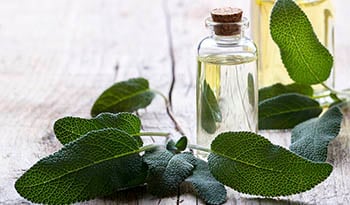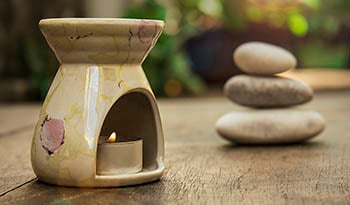Herbal Roll-On Remedies for Headache, Sleep and Cold and Flu
DISCLAIMER:This blog does not intend to provide diagnosis...
- In this article:
- Essential Oils for the Most Common Ailments
- Peppermint oil
- Eucalyptus oil
- Rosemary oil
- Chamomile
- Lavender
- Clary sage
- Lemon Oil
- Orange Oil
- Sweet Basil
- Ginger
- Natural Roll-on Pain Relief
- Roll-on Headache Relief
- The Sleep Cure
- Roll-on Natural Sleep Aid
- Defying Cold and Flu Season
- Cold and Flu Essential Oil Roll-on
- Choosing Natural Remedies

Combinations of essential oils and herbal treatments can be used to alleviate headaches, cold and flu symptoms and insomnia.
Even those who do everything in their power to maintain a healthy lifestyle cannot always escape the common cold, a raging headache or a sleepless night. For some, these maladies are regular invaders, and taking over-the-counter meds can have more undesirable effects in the long-run.
What kinds of natural alternative remedies are out there for ailments such as the flu or regular sleep issues? Some herbal remedies have been recognized for centuries for their curative powers and are still in use today around the world.
The truth is that the market for herbal supplements has been exploding in recent years, and many helpful remedies are now easy to come by at economical prices.
The internet is bursting with advice and instructions about the applications and usefulness of herbal remedies. For a person suffering from chronic headaches and sleeplessness, or for those suffering the ravages of the common cold or flu, it’s worth researching some basic herbal treatments to keep on hand.
Essential Oils for the Most Common Ailments
It may be beneficial to keep a supply of certain natural herbal treatments and essential oils. There is no herbal cure-all, but keeping a certain range of remedies at hand will be a great help for those who desire to utilize natural remedies.
One excellent way to apply herbal treatments is by using a roll-on applicator. Many companies that sell essential oils also sell roll-on application bottles for use in creating targeted combinations of herbal oils.
Here is a good list of some of the most commonly used essential oils, many of which can easily multi-task for many types of ailments. These oils would be some of the most useful to keep on hand at all times.
Peppermint oil
Peppermint oil is great for relieving sinus pressure, headache and muscle pain, cold and flu symptoms, and heartburn, and it has a natural calming effect.
Eucalyptus oil
This oil is antiseptic, antibacterial, and anti-inflammatory. It works as a decongestant and asthma relief, joint and muscle pain relief, and immune system stimulant. Eucalyptus oil is so useful that it should always be kept on hand for treatment of a myriad of common ailments.
Rosemary oil
Rosemary oil is a popular essential oil is a pain and stress reliever as well as a decongestant. It can be used for joint and muscle pain, tension and fatigue, and increased circulation.
Chamomile
Universally recognized for its aid in relaxation, chamomile is also recognized as a natural analgesic, relieving pain and stress.
Lavender
Another commonly recognized stress reliever, lavender can help relieve headache pain and anxiety, increase relaxation and sleep, and aid in the relief of pain and respiratory issues.
Clary sage
Clary sage has become an increasingly well-known and commonly used herbal remedy. It has many beneficial properties for headache sufferers such as relaxing blood vessels and helping to bring balance to hormones.
Lemon Oil
Lemon oil is an immune system stimulant, antioxidant, stress reducer, and respiratory aid.
Orange Oil
Orange oil is an antidepressant, anti-inflammatory, and antiseptic. This oil is a natural sedative and promotes detoxification.
Sweet Basil
Sweet basil oil is a great pain reliever for headaches or sore joints and muscles. This oil is also known for its ability to increase alertness and clear thinking.
Ginger
Ginger essential oil can help ease inflammation, pain, relaxation, and respiratory ailments.
It will also be necessary to keep a supply of some kind of carrier for roll-on oils, such as grapeseed or fractionated coconut oil.
Natural Roll-on Pain Relief
There are many kinds of headaches stemming from well-known sinus pressure to the ongoing mystery of debilitating migraines. Simply rolling on an herbal remedy may not completely cure the issue, but it can definitely be useful as either a stand-alone treatment or as a complementary aid for relief.
For those who take regular medication for migraines, it may be a good idea to consult the prescribing doctor about the use of herbal supplements for peace of mind. Especially with roll-ons, there is generally very little interaction with other meds, but it's better to be safe.
Roll-on Headache Relief
Ingredients:
- 10 ml glass roller bottle
- 5-10 drops peppermint essential oil
- 5 drops lavender essential oil
- 5 drops rosemary essential oil
Instructions:
- Add the drops of essential oil into the roller bottle.
- Fill the bottle with choice of a carrier oil such as grapeseed or fractionated coconut oil, leaving room for the ball.
- Apply in a complete circle around the hairline of the head, both front and back.
The Sleep Cure
For a roll-on sleep aid, consider the following herbal recipe combination.
Roll-on Natural Sleep Aid
Ingredients:
- 10 ml glass roller bottle
- 10 drops lavender essential oil
- 3 drops orange essential oil
- 3 drops Roman chamomile essential oil
- 5 drops vetiver essential oil
Instructions:
- Add the drops of essential oil into the roller bottle and fill with grapeseed or fractionated coconut oil, leaving a bit of headspace for the roller cap.
- Pop the roller into the bottle and add the cap.
- At bedtime, roll the oil on the bottom of feet, behind the ears, on the back of the neck, and in the palms of hands.
Other possible sleep aid essential oils may include frankincense, ylang-ylang, marjoram, and cedarwood.
Defying Cold and Flu Season
The duration of colds and the flu can be significantly shortened with the use of herbal roll-on applications. One possible recipe is the following.
Cold and Flu Essential Oil Roll-on
Ingredients:
- 5-10 drops Eucalyptus essential oil
- 2 drops fir needle essential oil
- 2 drops lemon essential oil
- 2 drops oregano essential oil
Instructions:
- Add the drops of essential oil into the roller bottle and fill with a choice of carrier oil, such as grapeseed or fractionated coconut oil, leaving a bit of headspace for the roller cap.
- Pop the roller into the bottle and add the cap.
- Apply at first sign of sickness every two hours until symptoms are gone. Apply to back of neck, chest, over lymph nodes on the throat, and to the bottom of feet.
There are numerous pre-mixed roll-on essential oil cold remedies for convenience, but for those people desire to monitor the quality of the ingredients more closely or create their own unique blend, some other possible cold and flu essential oils include ginger, tea tree, thyme, and clove.
Choosing Natural Remedies
There are many more beneficial essential oils than those named above. The best relief for an individual’s symptoms may depend on other physical factors, and any personal allergies should also be considered. With the current wide range of essential oil choices and research information available, it is possible to find natural, homemade relief in most cases.
Natural herbal treatments are not new, although their application continues to evolve. Roll-on mixtures are a more recent means of applying and storing the most commonly used treatments. Although the procedure may require some initial investment, the results can be worth the effort.
Essential oil remedies help to prevent the sometimes negative side effects of over-the-counter medications, such as digestive distress or a weaker immune system. Essential oils are generally non-addictive and produce fast relief from existing symptoms.




